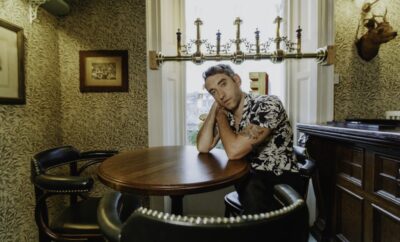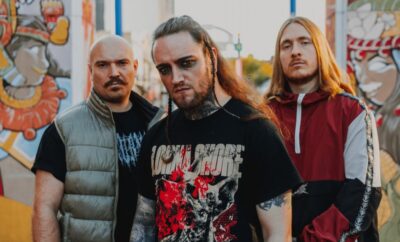
Interviews
Niki Black – Lilith
By: Jamie Steinberg
Q) How would you describe your sound?
A) This is one of the hardest questions for me. I could tell you some technical and sonic terms that would draw some similarities in your mind or reference artists who have inspired me or perhaps have songs that sound like some of mine. For me, it’s more about the feeling that you receive when you listen to my songs rather than the music itself because the songs to me act as the vehicle that you travel in to reach the feeling. Each song I create feels like there is no common denominator in a “sound” or “genre” because they’re simply different sonic vehicles taking you to different feelings and messages I imbued in them and want to express, which vary from lust to worship to fear – really the whole spectrum of the human experience. And these all feel and sound very different to me. So, I think sonically this naturally reflects in how varied the production, lyrics and sonics are. If this sounds too hoo-ha to you and I sound bananas, then I suggest you just consider me under the umbrella of “dark pop.”
Q) Who are some of your musical influences?
A) Freddie Mercury, Nina Simone, Edith Piaf, Jeff Buckley and Sevdaliza.
Q) Talk about the story behind your new song “The Other Man.”
A) I wrote this song when I was living in Florence and studying art history. Dante Aligheri wrote The Divine Comedy – Inferno, Purgatory and Paradiso based on this mosaic of Lucifer in the Baptistry. And on my way walking to see it, I started channeling this melody and piecing together the lyrics “I want to see my man.” I was really excited by this seemingly sinister concept of going to see a mosaic of Satan because it would scare most people. Even though I am as equally obsessed with Jesus art as I am with Satan art, it’s just contextual to me as a person studying art history with a theological emphasis. I’m not afraid of these connotations of darkness and hell, but fascinated with engaging the meanings they hold and how the past informs the remaining resonance even in present day. And just like that, this whole song idea was born about wanting to see a person who you are told by society and others not to see because their deemed as dangerous. Later I adopted it to the story particularly of the serpent to represent Satan in Adam and Eve and realized the temptation actually embodied the feeling of cheating, flipping the common trope of “the other woman” and exploring the perspective of “the other man.” It’s up to you when you listen to make your judgment on your interpretation in whole, but in this song, temptation is viewed as a necessary feeling of growth. Ultimately, the song illuminates the story of questioning loyalty to not only a lover that is unfulfilling or condescending, but also the overarching feeling of being controlled. Eve is forbidden to talk to the serpent, the other man, and eat the forbidden fruit, symbolic of disobeying the expectations that were set on her and she dared to question. There are many different ways this symbolic relationship of leaving an old way of life for a new way of life that goes beyond the literal translation of leaving one man for the other. It’s the story of departing from your old consciousness and choosing another one, for yourself completely.
Q) What do you think it is about the song that fans connect to?
A) I think this story is really relatable, but there is a shame and hush factor in expressing lust freely for others as it is morally judged as wrong and repressed. I think the thrill of temptation is an electrifying story to listen to and comforting to those who feel they need to break free from someone or something.
Q) How does the video for the track play into the message behind it?
A) Val Vega was my editor for this and I want to give her major props in conveying this frenzied and exciting feeling of lust and confusion with her skillful editing work. I love that there are these very fast-moving frames that juxtapose the two themes of lust, represented by me dancing a Persian style Serpentine movement in a red dress, juxtaposed with me at a cemetery in a mourning state for the lover and life I am leaving behind.
Q) What is your song writing process? Do you need music before you can create lyrics?
A) I’m sure that the popular answer that may be cliched by now, but I just know it’s true for writers – there is no particular process! I even question that a song reaches its final form, I feel that the song keeps evolving and I may change lyrics as I perform them, add more and I do these either pre-emptively or simply in the heat of the moment. I write some songs completely on the spot, just me and the piano. I write others based on a line of poetry in my notes I wrote years ago. Then, of course, I’d love to learn to produce my own songs fully. But, as of now, I love collaborating with producers and songwriters, where we either build a track together or they send me their beats to play around with.
Q) How much of hand do you have in the production of your music?
A) I don’t physically engineer, but I consider myself heavily involved in the production of the music, especially as a pianist and laying down those parts as well as harmonies. Sometimes my intuition grants me a strong opinion, but other times a producer presents you with something so amazingly IT and on point that I have no comments or hand in it – just a big, grateful smile on my face.
Q) What can fans expect from a live Niki Black performance?
A) I feel like I have two different kinds of shows in my arsenal. There are ones that are me on piano, background singers, drums, guitar and bass that feel more sonically experiential and emotively raw. Then, I’ve done these fully choreographed concept shows where I’m not on the piano at all, tracks envelope you in bass and synth while the set is fully choreographed with dancers and lights for a full theatrical dark pop effect. I guess it depends which venue I am preparing for- and I’d like a show with budget big enough to have both the way Gaga does it, but I honor both approaches and sides of the artistry of the songs, even if they do feel very different – I don’t think it’s a bad thing.
Q) What songs off your upcoming LP Lilith are you looking forward to performing live?
A) There is this one song called “Cursed,” the only one that I haven’t performed live yet. So, I am looking extremely forward to that one!
Q) What do you hope listeners take away from listening to the LP as a whole?
A) This is also a tricky question because even though this album is the story of Lilith, I want to give everyone a truly unique sonic experience that song by song follows the storyline and emotions of falling from Paradise to Hell. Lilith, in ancient mythology, chose to leave Eden for Hell in the ancient myths with no regrets, which is why I drew inspiration from her story and dedicated by album to her and was fascinated by this concept and why she has been demonized in history and hailed as inspiration for others. Ultimately, I hope that everyone can tune into the ultimate idea that self-realization is heaven on earth, and even if you may have to go through hell just to find that, it’s absolutely worth it.
Q) Where are some of your favorite places to perform and what makes those locations so significant to you?
A) In Los Angeles I love the venues of the Peppermint Club and Hotel Café just because they feel so Los Angeles to me and really engaged and I’ll always have memories scrambling to get people there. Living in Paris I love performing at Aux Trois Mailletz because Nina Simone used to sing there and there is a real sense of history and engagement there.
Q) Who would you most like to collaborate with on a song in the future?
A) Sevdaliza.
Q) What album/band are you currently listening to and why do you dig them?
A) I can’t stop listening to The 1975 like a damn fan girl. Matt Healy just channels the most insane resonances with majorly intelligent, witty lyrics that really have deep meanings.
Q) You are a part of social media. Why is that such an important way for you to connect with your fans?
A) I love using social media to be visually expressive and interact. It’s overwhelmingly cool that we can connect and express so immediately and creatively. I also feel like the imagery that I engage with helps give the music more meaning and its own visual universe. Also, it’s a great way to get ego boosts from strangers.
Q) What would you like to say to everyone who is a fan and supporter of you and your work?
A) I would like to say a heartfelt thank you to every person who has supported me with my music. If you support me as a creative artist, it symbolizes so much more than that to me – it is a sweet encouragement that my self-exploration and creative expression resonate with people and matter, validation that as I continue to follow my dreams, I’m not alone in believing in them.





You must be logged in to post a comment Login